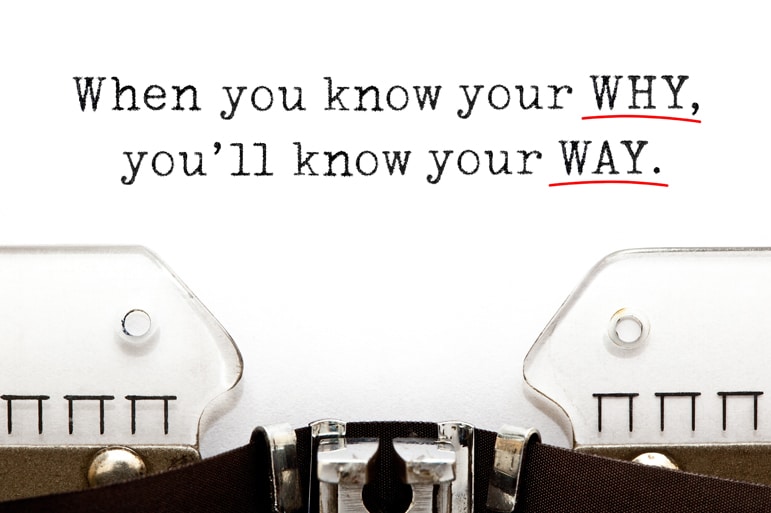Today I present what I believe is the most important reason for resolution failure. It is “Number 1” because, in its absence, it is most central to failure; in its presence, it is most central to success. Regarding other, less central reasons: we can fail in our resolutions even when we have the time and energy for them (the third most important reason) and even if we can succeed in confronting and overcoming the ‘hardness’ of doing the tasks necessary to reach the resolved goal (the second most important reason).
Today’s focus, the first most important reason for failure, is this: if what we resolve is not important enough to us, we are unlikely to follow through on it. When we resolve to do something that does not address a central concern in our lives, it falls by the wayside. In these cases, the change we propose to ourselves remains ‘an orphan’ because it does not connect to a greater good, to a core life value or goal. Instead, it remains isolated, perhaps a ‘nice to have’ or ‘nice to be able to’ achievement but without greater meaning or consequence. Such isolated and limited goals do not have the context and support of either a greater good or of other actions also undertaken to meet that greater good.
Example: “I want to lose ten pounds.” Why? Sometimes we don’t even ask ourselves the first why let alone the second, third, fourth, or fifth why. (I’ll return to the ‘5 Whys’ later.)
Of course, to succeed in meeting the goal we set for ourselves requires instantiating, throughout the moments of the day, all the many small decisions and actions needed to act one way, the new resolved way, rather than continuing the current, less-than-satisfactory, way. So, yes, succeeding in life change requires grounding those many decisions and actions in the activities of one’s day and doing so every day.
But these many small decisions and actions will not succeed unless and until they are a way of achieving something much grander and of greater importance to us. Losing ten pounds requires many small daily choices and actions AND also a damn good reason to suffer through those many uncomfortable, unwanted, hard, painful sensations (like hunger, loss of motivation, self-doubt) and new behaviors (like going to the gym in the sleet and rain, or making and eating foods that aren’t naturally satisfying).
I believe that the most success-inspiring reasons are the ones that most allow us to strive towards what we feel transcends us. Our reasons for acting must point us to a place – the place of arrival – that is beyond our current preoccupations, fears, and desires; beyond us and our bounded circle of the here and now. On a smaller scale, the transcendent is that which forms our core life goals and values, that carry us through the years of our lives. On a larger scale, the transcendent refers to what lies beyond the present reality, outside of space and time, beyond the material world, and in the supernatural or divine realm.
That which we find or define as transcendent is that which we make (or can make) of ultimate concern to us, that which we can live ‘in the light of’. Living ‘in the light of something’ is the original meaning of ‘mindfulness.’ For example, the Buddha used the Pali – an ancient language of the Indian subcontinent – word ‘sati’ to refer to one aspect of the Noble Eightfold Path, a word we translate as ‘mindfulness.’ Today, the core meaning of mindfulness is attending to the here and now in an intentional and nonjudgmental way. Yes, this is a part of mindfulness, but it leaves out the other core aspect of mindfulness, that of perceiving and acting in the present moment in the light of … of what? Of something that transcends the present moment. What could that something be? The answer is that which is of ultimate concern to us. For the Buddha, it was to be ever mindful of the Four Noble Truths as they were instantiated throughout the adept’s life in and through his or her adherence to the Noble Eightfold Path.
So, how can a person discover their ‘Noble Truths,’ their ultimate concerns? Well, many people already have such ultimate concerns firmly in mind, many through their religious faith. Many others have not yet fully or deeply articulated their ultimate concerns.
So, see this journey I’ve taken you on. I started with ‘losing ten pounds’ and I’ve taken you to ‘ultimate concerns.’ Have I overdone it, drawn connections between some small life change and what is or can be of the greatest concern to us? Maybe. Maybe losing ten pounds does not have to bring up such cosmic speculations. It doesn’t. But maybe it can. Maybe it is an opportunity to do exactly that: to use the occasion of coming up with New Year’s resolutions to consider the meaning and purpose of one’s life and to align one’s ultimate concerns with the actions one takes throughout each day. When done, one then lives each day and undertakes decisions and actions within an abiding wholeness, healthiness, and holiness. (BTW, all three of these words have the same root.)
I’m not done yet.
There is still another opportunity that lies within thinking through New Year’s resolutions. Let me illustrate with the ‘losing ten pounds’ example and the ‘5 Whys’ approach I mentioned earlier.
So, let’s say you want to lose ten pounds and you proceed through the ‘5 Whys’ method. (This is a method developed by Sakichi Toyoda, the founder of Toyota Motor Company, and the rest of the Toyota conglomerate. He used it as a method to identify the root causes of manufacturing defects. The ‘5 Whys’ has now been adopted for use as a self-help method for gaining greater life understanding.)
With the ‘5 Whys,’ you start by articulating your desired change: “I want to lose ten pounds.” You proceed by asking your first ‘Why?’ “Why do I want to lose ten pounds?” With every response to a ‘Why,’ you ask the next ‘Why?’ So, to the question “Why do I want to lose ten pounds?’ I might respond with “Because I want to look better on the beach in my bathing suit.” In response to “Why do I want to look better on the beach in my bathing suit?” I might respond with, “Because I want to feel more attractive.” And to “Why do I want to feel more attractive?” I might answer, with an uncomfortable realization, “Because I feel unattractive.” And how might I answer “Why do I feel unattractive?”? You can see how this series of self-questioning can become uncomfortable or scary.
Doing the ‘5 Whys’ forces a confrontation with what lies at the heart of many of our desires and fears. At the heart of “I want to lose ten pounds” might lie the lifelong fear or even conviction of “I am ugly” or “I am unlovable” or “I am not worthy of being loved” or “I will be found out.”
This is harsh, so harsh. And yet sometimes these are exactly the dark fears or convictions that have sometimes been present, under the surface of realization and articulation, our entire lives.
So, use caution. Not everyone is ready to probe so deeply. You may want to work with a coach or therapist. And, of course, not everyone has such dark fears or convictions that will be unearthed.
Do what you will with what I wrote. Resolutions are an opportunity to align your quotidian actions with what transcends you. It is also an opportunity to probe yourself and that which drives you. I’ve written much about resolutions, and I’ve done so for these reasons. There is a depth to considering and making resolutions that often remains unseen.
To preview future posts: for 2024, my resolution is to live – to align my choices and my actions – in the light of an ‘as if’ belief that I have only this one year to live. Although I feel I accomplish a lot, I also remain prone to procrastination. And this weighs on me. I want to see if living in the light of taking on this belief ‘of one year to live’ will allow me to make better choices and undertake better actions.
‘Til next time,
Dr. Jack
Language Brief
“You act like mortals in all that you fear, and like immortals in all that you desire.” ― Lucius Annaeus Seneca
“They lose the day in expectation of the night, and the night in fear of the dawn.” ― Lucius Annaeus Seneca
“We never know how high we are till we are called to rise. Then if we are true to form our statures touch the skies.” ― Emily Dickinson
“That it will never come again is what makes life so sweet.” ― Emily Dickinson
“…the time of life is short; To spend that shortness basely were too long.” ― William Shakespeare
“In the world of the living, one must live.” ― Silvia Moreno-Garcia







Leave A Comment